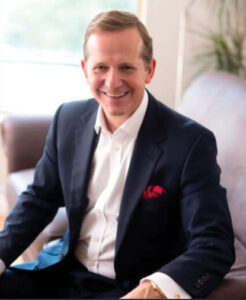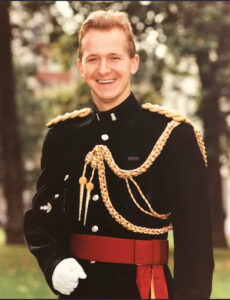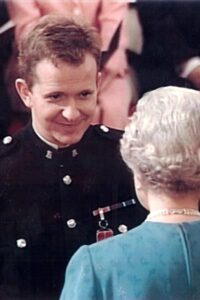Jonathan Bowman-Perks is a globally-renowned CEO leadership & team coach, who provides support to some of the world’s biggest brands. He’s also a prolific interviewer and broadcaster, leveraging connections from years in both military and corporate life to produce the Inspiring Leadership podcast.
Jonathan did the Hoffman Process in December 2022 and subsequently invited Hoffman UK’s Managing Director, Serena Gordon, to be a podcast guest (you can find the episode here). We caught up with Jonathan to ask him what had brought him to the Hoffman Process and how it has impacted his life and career.
 Who or what inspired you to do the Process?
Who or what inspired you to do the Process?
I’m a bit of a course junkie – I love my courses, I love my self-development. I also develop other people professionally. One of my CEOs and another client had done Hoffman and recommended it, so I listened to the Hoffman audiobook ‘You Can Change Your Life’ and decided to sign up. I’m a great believer in leading by example, ‘going there’ myself first. How can I recommend something unless I know what it’s like? My wife Leigh and I also attended a Hoffman relationship workshop before I attended the Process, and were impressed by the content and the quality of facilitation.
Was there a moment on the Process that felt like a changing point to you?
I found the work that we did on Transference useful – recognising when it’s ‘our stuff’ and when it’s ‘other people’s stuff’, and tracing the connection between those.
I also appreciated my self-awareness being challenged in different ways, not all of them formally ‘taught’ in the sessions. For example, I’m one who prepares a lot for courses and I really have a pattern of wanting to ‘please teacher’ – definitely one I recognise from childhood and also the competitive / comparative world of military training and the Staff College, where the aim is always to be in the top 10 percent. In preparing for the Process, I realised that I had to get rid of my Apple watch and my phone and that kind of stuff, and I was very happy to put it all in a bag and and not look at technology for those seven days. It was so healthy doing that and also having a normal, manual watch that just ticked away…
But the group on my course, recognising how punctual I was and the intensity of my need to do things ‘properly’, said ‘Jonathan, your challenge is to be late by five minutes for everything’. I groaned at the thought; ‘Noooo! Don’t ask me to do that! Noooo! My world will fall apart!’ But I did do it for about three or four sessions, until it was actually beginning to be disruptive for the group. It was all very lighthearted and we joked about it. But although we all had a bit of a laugh, there was quite intense learning in that for me too.
Have there been any positive changes or awarenesses in your life since doing the Process?
 One of the things I was already working on before Hoffman was the art of acquiescence; being more accepting, less in control, less judgmental, less critical.
One of the things I was already working on before Hoffman was the art of acquiescence; being more accepting, less in control, less judgmental, less critical.
As an officer, there are definitely standards – ‘this is the way one should behave’ – and meeting those standards involves putting on masks to face the world. I think one of the things the course gave me is permission to start removing layers and layers of those masks to see the ‘real’ Jonathan underneath. And there’s a real benefit to doing that, rather than trying to put on a show, because people know when you’re putting on the show, people can tell; they can smell it, they can feel it, they can sense it – and they start to feel ‘I don’t buy into this at all.’
But unmasking involves vulnerability. Vulnerability for somebody in the police or the ambulance or the armed services is seen as a bad word – you know, ‘the position was vulnerable, you took it’. So if there’s a choice between being strong or vulnerable, they’d rather be strong. But if we perhaps replace vulnerability with authenticity – just being genuinely yourself and that’s OK – there’s a real strength in that too.
I also gained a real, lived, sense of the old saying that ‘success is getting what you want and happiness is wanting what you already have’.
What areas of your life has the course had the biggest effect on?
 Relationships. Without a doubt. It’s had a huge impact on my relationships, especially with my immediate and my extended family. And that impact is about behaviour and actions, not fine words; they’re seeing the result of what happens differently once you come from a place of choice, not a place of patterns and fear. My wife and daughters have noticed a big change. My relationship with my ex-wife has also improved as a result of the work I did on the Process. Both daughters are getting married this year, and what could potentially have been quite an acrimonious day – with the girls caught between two warring parents – is now something we can all look forward to.
Relationships. Without a doubt. It’s had a huge impact on my relationships, especially with my immediate and my extended family. And that impact is about behaviour and actions, not fine words; they’re seeing the result of what happens differently once you come from a place of choice, not a place of patterns and fear. My wife and daughters have noticed a big change. My relationship with my ex-wife has also improved as a result of the work I did on the Process. Both daughters are getting married this year, and what could potentially have been quite an acrimonious day – with the girls caught between two warring parents – is now something we can all look forward to.
My father was killed in a defective fast jet when I was very young, so I don’t remember spending a lot of time with him. After Hoffman, encouraged by my wife, I took my (grown up) daughters to Dubai for ‘dad and daughter’ time and we had the best time ever. There were tears, there was joy, there was happiness, we went sand surfing, we did the leap of faith and the water park, yelling and screaming and having incredible fun. It was just such a lovely, special experience to be able to share with them.
In my work as a coach, I’m interested in the concept of Radical Candor – holding boundaries with authenticity, but also with kindness. I think it is certainly something I gained personally from the Hoffman Process, the ability to express what I think and what I feel without having to have the other person particularly like it. I think popularity was always something that I was hung up on; I can now choose to prioritise respect over popularity. My work will definitely benefit from that.
And finally, how would you finish this sentence: “The Hoffman Process allowed me to..?”
‘Drop the masks and truly be myself, in order to inspire leadership in myself and others’. It’s one of the best courses I’ve done in my 61 years of life – had I done it in my 30s, I know I would definitely have been a better father, son and officer.
Thank you to Jonathan for agreeing to be interviewed. You can find out more about Jonathan’s leadership coaching and advisory work with CEOs and top teams here and his Inspiring Leadership Podcast is here.





 Sign up to receive monthly newsletters from Hoffman
Sign up to receive monthly newsletters from Hoffman